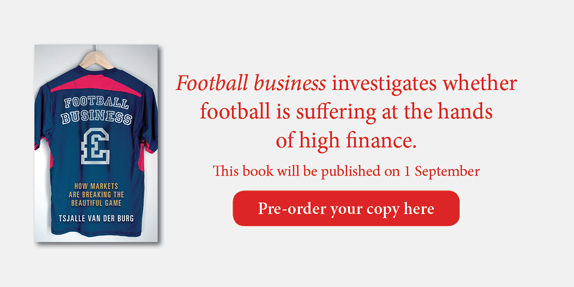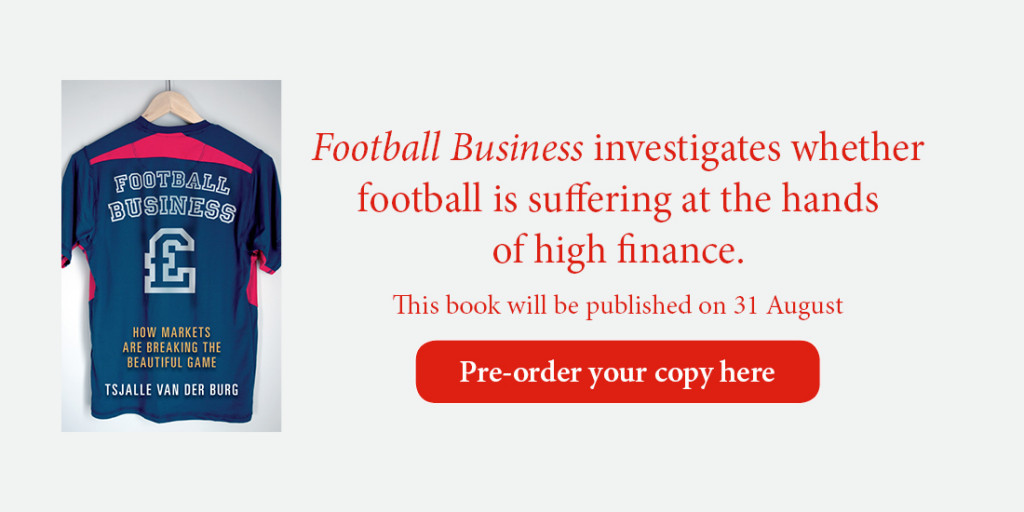Football Business
The Premier League season 2014–2015 kicks off
15 August 2014 by Rebecca in Business and finance, Football Business
Well, after what seems like an eternity with not even a mention of football, the new Premier League season is about to begin. So are you excited, wondering how your team will fare this year? Looking forward to some flashes of goal-scoring genius? Wondering who the season’s new star will be (perhaps it’s the manager – or perhaps not)? More importantly – have you been saving up?
As football fans are all too well aware the price of following the world’s favourite sport can take its toll – some have even started to protest the prices of attending a match. When you look at some of the costs assiociated with supporting football these days you can start to see why these fans are angry. Here are just a few examples of current Premier League prices:
- A season ticket for last year’s cup champions Arsenal, the Premier League’s most expensive, will cost you a minimum of £1,014. Which makes last year’s league champions seem like a bargain – a season ticket at City will only set you back £299.
- A ticket to Manchester United’s match versus Swansea at Old Trafford tomorrow (could you get your hands on a legitimate one) will set you back between £31 and £53.
- Should attending matches be too rich for your blood you could always subscribe to Sky Sports for an extra (yes, on top of your basic subscription) £24.50/month. But don’t forget you’ll need an account with BT too if you want to watch all the Premier League matches, as many of the top games this season will be live on BT Sport.
- A shirt for any of the big five costs £49.99. If you want one for your offspring too that’s another £35–40 per child.
But OK, it’s 2014 and the prices of everything have gone up in our lifetimes; that’s the way commerce moves. Perhaps it doesn’t matter that with your season ticket to Arsenal, a new shirt and attendance at all the away games you’re going to be spending in the region of at least £2000, if you get £2000-worth of enjoyment from it. But as author Tsjalle van der Burg points out in his new book, Football business, the cost of football has risen out of line with the economy as a whole. He thinks it’s unlikely that the enjoyment of fans has risen in line with the costs of being a fan.
In fact the way football is run now it is likely that it has become less enjoyable for the fans, largely due to what Van der Burg calls ‘competitive inequality’. In simple terms this means that the wealthier clubs (those owned by oligarchs and sheikhs) can afford better players, making them more likely to win tournaments and leagues. Consistently winning teams get more supporters and sell more tickets, get more promotional opportunities and make more money from the TV rights to games. So the rich become richer. If you support a less wealthy club, watching matches against the wealthier clubs can be frustrating as you know you have very little chance of winning. But this inequality can also make games less enjoyable for the fans of wealthier clubs – if you know you have very little chance of losing, a lot of the excitement of winning is taken away. As Van der Burg points out, enjoyment can’t be measured scientifically but he notes:
“In football, the quality of the basic product – football matches – has not improved over the years. Barcelona–Real Madrid is no more enjoyable or exciting today than it was in the past. Lionel Messi does not entertain the average Barcelona fan more than Johan Cruijff used to. And in all competitions, fewer goals are scored now. It’s a safe bet that in the next final of the Champions League there will not be ten goals in 90 minutes, as there were in the 1960 European Cup final. One of the reasons may be that current coaches put results ahead of entertainment, precisely because of the enormous amounts of money at stake.”
Van der Burg is an economist so he has tried to work out the problem using economic calculations. He asks if the sport would be more enjoyable if all clubs had the same chance of winning. You might think the simple and obvious answer is ‘Yes’ but as Van der Burg points out, if you take it down to bare statistics it’s not that clear cut – after all Liverpool have far more fans than Swansea so when Swansea beat Liverpool the enjoyment is experienced by a smaller proportion of fans. But:
“If Swansea were to win the title next year, the pleasure of the average fan of the league champion would possibly reach an all-time high. In addition, people who have sympathy for the underdog would also be pleased. A Swansea title would show that, however hopeless a situation may seem, and however life turns against you, hope is always justified. This will also make the fans of other clubs feel better during the next season, since much of their pleasure is based on hopes and expectations. Indeed, this is what [Major League Basebell promoter] Bill Veeck taught us long ago: sports clubs produce dreams. And to enable fans to dream, it would help if clubs like Swansea had some chance of winning the title one day.”
One thing is certain – football has more fans than ever worldwide. When the season kicks off at Old Trafford at 12.45 tomorrow excitement will be high not just in Swansea and wherever it is that United’s fans live but as far afield as Asia and South America. If we could find a way to keep that feeling going for all fans all season we’d be on to a winner.
Do you think football has become too expensive? Have you lost your enjoyment of the game as prices have risen or do you think it has become more exciting and enjoyable? Let us know what you think by filling in the comment box below or contacting us via Facebook or Twitter using the social media sharing buttons.
Are the high salaries of footballers like Luis Suárez justified?
23 June 2014 by Rebecca in Business and finance, Football Business
By Tsjalle van der Berg, author of Football business
Edson Arantes do Nascimento, who you know as Pelé, had the nickname ‘O Rei do Futebol’. He will forever be associated with one particular piece of skill at the 1970 World Cup in Mexico. From the halfway line, the Brazilian fired the ball over the Czech keeper, who was way off his line and turned to see the ball dip just in time. Nothing like it had ever been seen before during a World Cup match. Unfortunately I was not allowed to watch it on TV as a child in 1970 because the match was broadcast late at night. So I was very pleased when footage from the game was recently shown on TV. And it was worth watching. The keeper was not even that far out of his goal, and the trajectory of the ball was even more impressive than I had imagined. Pelé even had a surprise in store for me: the ball went just wide.
These days you see the occasional lob like Pelé’s, and now and then one even goes in. In 2014, Wayne Rooney scored a fantastic goal like that against West Ham United. Does that make him better than ‘O Rei do Futebol’? Sadly, no. What made Pelé’s lob so special was that he was the first who dared to try a lob in an important match. It may well be that the Pelé of old would have struggled in today’s football. Today’s players are physically and tactically stronger. No matter. Pelé gave people pleasure because he was better than his contemporaries.
What would have happened if the hundred best players of all time had never been born? Other players would have taken their places as superstars. Someone else would have been the first to lob the keeper from the halfway line. Of course we would have had to do without a few delightful pieces of skill, such as Robin Van Persie’s beautiful header against Spain during the present World Cup. Still, the pleasure had by all the fans put together would not have been much less as a result. Because football’s main attraction is the excitement and the contest against the opposition.
What does this mean for the debate about players’ wages? Are Messi’s millions justified because he entertains so many people and because, partly as a result, people are prepared to pay so much to watch Barcelona on TV and buy club merchandise? From the individual perspectives of Barcelona and Messi, there is something to be said for that view. But you can also take a broader view. Without Messi, someone else would be the world’s best payer, and that player would also be much loved. The ultimate reason fans spend a lot of money on football is that the sport is so popular. And that is largely due to the volunteers, supporters and rather poorly paid players of a previous era who made football what it is today.
So in my opinion, the salaries of present-day players are too high. It’s not the stars that make football. It’s football that makes the stars.
 Without Luis Suárez, Liverpool would not have finished second last season. They might not even have qualified for the lucrative Champions League; Everton could have qualified instead. So from Liverpool’s perspective, it is quite justified that Suárez earns many millions a year. And for the fans of the club, Suárez is really worth his salary as he has given them so much joy. Moreover, he did a lot to brighten up the lives of his fellow countrymen by helping Uruguay beat England last week. No-one in Uruguay will be begrudging him his salary now. But to the world as a whole, his value is far more limited. For instance, Uruguay’s joy after the two Suárez goals stands in contrast to the pain of the losing country – and Suárez is responsible for that too. Perhaps all the suffering he has caused should be docked from his wages …
Without Luis Suárez, Liverpool would not have finished second last season. They might not even have qualified for the lucrative Champions League; Everton could have qualified instead. So from Liverpool’s perspective, it is quite justified that Suárez earns many millions a year. And for the fans of the club, Suárez is really worth his salary as he has given them so much joy. Moreover, he did a lot to brighten up the lives of his fellow countrymen by helping Uruguay beat England last week. No-one in Uruguay will be begrudging him his salary now. But to the world as a whole, his value is far more limited. For instance, Uruguay’s joy after the two Suárez goals stands in contrast to the pain of the losing country – and Suárez is responsible for that too. Perhaps all the suffering he has caused should be docked from his wages …
Dutchman Tsjalle van der Burg is an economist and Robin Van Persie fan
World Cup 2014: will goal-line technology stop injustice in football?
13 June 2014 by Rebecca in Business and finance, Football Business
By (a currently very happy) Tsjalle van der Berg, author of Football business
Right at the beginning of most John Grisham books, a person appears who is confronted with circumstances which completely disrupt his happy life. Sometimes this is mainly bad luck, but often serious injustice is done. And then the person starts to fight the injustice, making the story a bestselling one. As an economist, I like that; high sales are good for the economy, and for employment too. Yes, injustice brings many good things – thanks to the hero who fights it of course.
Grisham is an open-minded man, but as a writer he refuses to have any discussions with the characters in his book. He simply does not listen to them. That’s good, because his heroes would tell him injustice should never be tolerated. This is how real heroes think. So if Grisham did what his heroes wanted, there wouldn’t be any injustice at all in his books – not even at the beginning. That would damage book sales. So Grisham is doing the right thing, in my view.
During the round of 16 match between England and Germany at the 2010 World Cup in South-Africa, the referee did not award a goal when Frank Lampard’s shot crossed the line. And so England lost. Yes, great injustice was done! In the media, many well-known players and coaches protested and pleaded for goal-line technology to assist the referee in such cases of doubt. Good. Our football heroes are examples for people all over the world, and they should make it clear that fairness is good.
 But players and coaches are no more than characters in the book called ‘Football’. The author of that book is FIFA. This author has, unlike John Grisham, recently listened to the characters in its book. And so the present World Cup has goal-line technology, which will make the game more just, but arguably less exciting to watch.
But players and coaches are no more than characters in the book called ‘Football’. The author of that book is FIFA. This author has, unlike John Grisham, recently listened to the characters in its book. And so the present World Cup has goal-line technology, which will make the game more just, but arguably less exciting to watch.
Of course, FIFA president Blatter can argue he is not only a writer, but also a character in the book called ‘Football’ – so he should set a good example for children too. And children will understand that the new technology is fair. But if this is Blatter’s argument, why is FIFA itself so corrupt? Why does it let big sponsors make money while the poor in Brazil suffer as a result? What kind of examples are these? If FIFA really wanted to fight injustice, video replay for referees should not have been its first priority.
Anyway, we have to face it: technology has become part of the game. But I still remember that match between England and West-Germany in 1970, at the World Cup in Mexico. The match was thrilling even before it started, as the Germans wanted revenge for that highly debatable English goal at the World Cup final at Wembley four years before. Hopefully, England will meet the Germans during the elimination stages of the current World Cup, in Brazil. If so, everyone should watch that one special game. It will be the first World Cup in which footballing heroes can expect real justice in undoing the injustices of the past. Now all England needs is for Lampard to score that same goal again!
- « Previous
- 1
- 2


